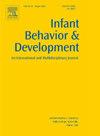新生儿神经行为和婴儿气质的父母有和没有多动症
IF 2
3区 心理学
Q3 PSYCHOLOGY, DEVELOPMENTAL
引用次数: 0
摘要
注意缺陷/多动障碍(ADHD)是儿童最常见的神经发育疾病。在症状出现之前识别新出现的ADHD信号是早期干预和预防相关损伤的必要的第一步。目前的研究调查了新生儿神经行为与儿童多动症相关的婴儿气质特征之间的关系。新生儿(经后43-49周);N = 78),其中一半的儿童ADHD的可能性增加是基于父母的ADHD,使用新生儿神经行为量表(NNNS-II)进行评估。父母随后在婴儿7-10个月大时使用婴儿行为问卷报告婴儿气质。父母是否患有ADHD的孩子在新生儿神经行为上没有差异。父母患有多动症的婴儿控制力较弱,负面影响较大。更大的非最佳反射和中枢神经系统压力禁欲迹象与婴儿期较少的努力控制有关。然而更强的新生儿自我调节能力与婴儿期更多的负面影响相关。行为和情绪失调风险的早期神经行为信号与后来的注意力问题有关,早在新生儿时期就可以检测到。需要纵向随访到ADHD可以临床评估的年龄,以检查这些神经行为表现作为儿童ADHD的预测因素。本文章由计算机程序翻译,如有差异,请以英文原文为准。
Neonatal neurobehavior and infant temperament amongst offspring born to parents with and without ADHD
Attention-deficit/hyperactivity disorder (ADHD) is the most common neurodevelopmental condition of childhood. Identification of signals of emerging ADHD before the onset of symptoms is a necessary first step to intervening early and preventing associated impairments. The current study examined the relation between neonatal neurobehaviors infant temperament traits known to be associated with childhood ADHD. Neonates (43–49 weeks postmenstrual age; N = 78), half with increased likelihood of childhood ADHD based on parental ADHD, were assessed using the NeoNatal Neurobehavioral Scale (NNNS-II). Parents later reported on infant temperament using the Infant Behavior Questionnaire at 7–10 months of age. Offspring born to parents with and without ADHD did not differ on neonatal neurobehavior.Infants of parents with ADHD had less effortful control and greater negative affect.Greater non-optimal reflexes and central nervous system stress abstinence signs were associated with less effortful control in infancy. Whereas greater neonatal selfregulation was associated with more negative affect in infancy. Very early neurobehavioral signals of risk for behavioral and emotional dysregulation associated with later attentional problems to be detectable as early as the neonatal period. Longitudinal follow-up to the age at which ADHD can be clinically assessed is needed to examine these neurobehavioral presentations as predictors of childhood ADHD.
求助全文
通过发布文献求助,成功后即可免费获取论文全文。
去求助
来源期刊

Infant Behavior & Development
PSYCHOLOGY, DEVELOPMENTAL-
CiteScore
4.10
自引率
4.80%
发文量
94
期刊介绍:
Infant Behavior & Development publishes empirical (fundamental and clinical), theoretical, methodological and review papers. Brief reports dealing with behavioral development during infancy (up to 3 years) will also be considered. Papers of an inter- and multidisciplinary nature, for example neuroscience, non-linear dynamics and modelling approaches, are particularly encouraged. Areas covered by the journal include cognitive development, emotional development, perception, perception-action coupling, motor development and socialisation.
 求助内容:
求助内容: 应助结果提醒方式:
应助结果提醒方式:


